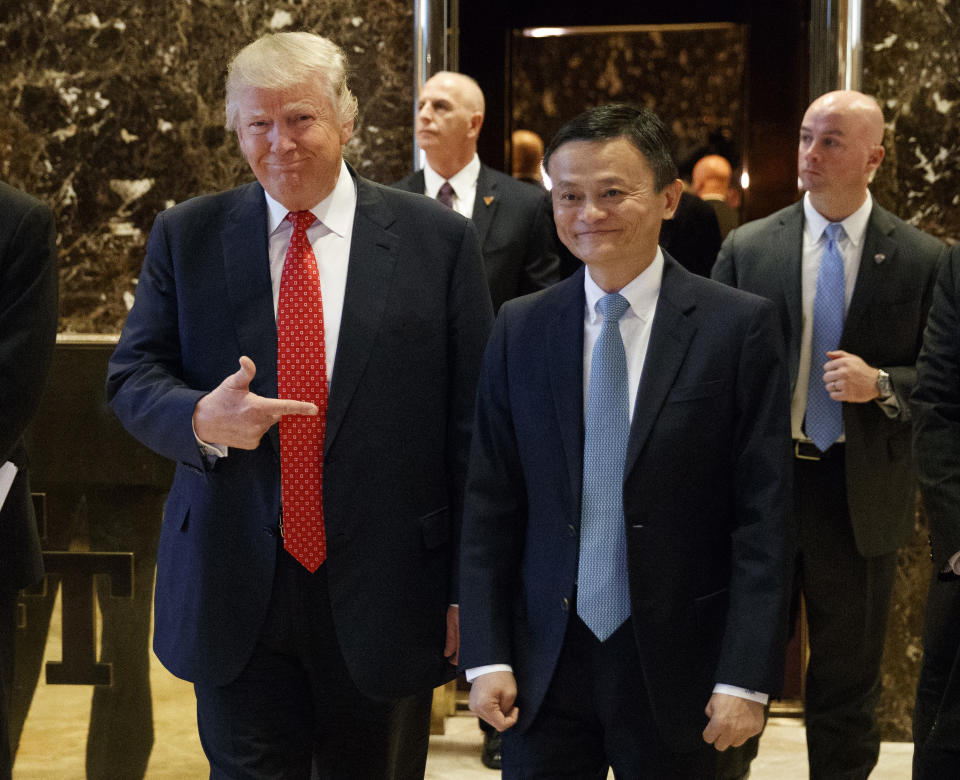How Alibaba shields itself from Trump's trade war
China’s homegrown e-commerce company Alibaba (BABA) is publicly traded in the U.S. and expanding worldwide so it would naturally be in the middle of trade tensions between Washington and Beijing.
That concern came up during Friday’s earnings call: How does Alibaba, a beneficiary and advocate for international trade, protect itself from a looming trade war.
“The trade war right now is really just between the United States and China, so it’s really limited to that trade flow,” said Joe Tsai, Alibaba’s co-founder and executive vice chairman. “When Chinese consumers look abroad to buy things from overseas, there could be replacements.”
Alibaba reported a strong quarter with a 61% revenue growth to $9.73 billion from a year earlier, and 552 million active annual users shopping on its online marketplace, up 37 million from a year earlier. “You can view Alibaba as a very large platform for producers from all around the world to access Chinese consumers. And the number of users make it attractive to producers around the world,” Tsai said.
He also reiterated that a trade war is not good for anyone and will hurt small businesses in the U.S. But for Alibaba, “there will always be alternative channels for us to bring in imported products to satisfy Chinese consumers.”
Alibaba’s interest in the U.S.

Though the U.S. is still far from a core market for Alibaba, the e-commerce giant has been aggressively courting U.S. small businesses to sell on its platform. Last June, Alibaba hosted its biggest public event in the U.S., where Alibaba Chairman Jack Ma addressed 3,000 small business owners and told them that they should not only import from China, but also sell to China.
In a January 2017 meeting with President Donald Trump, Jack Ma pledged to create 1 million U.S. jobs for small businesses that sell goods to Chinese consumers within five years. But he backed off a bit as trade tensions escalated between the U.S. and China with both countries announcing tit-for-tat tariffs on imported goods.
When asked about his promise at the Boao Forum for Asia last month, Ma said, “If China, USA have a good relationship, we can not only make 1 million, we can make 10 million, 20 million jobs for both countries. If they have no good trade relationship, we’re going to destroy 10 million jobs.”
Alibaba has already felt some pressure in the U.S. as it tries to expand its footprint. Alipay, the affiliate mobile payment platform that Alibaba recently bought a 33% equity stake in, tried to acquire Dallas-based payment service provider MoneyGram. but the deal was blocked by the U.S. government earlier this year for national security concerns.
Right now, Alibaba is doubling down on Southeast Asia, an early-stage market closer to its home base. Alibaba’s international commerce retail business grew 94% to $727 million from last fiscal year, with Southeast Asia as a major driver.
“We sent our best people in Alibaba who have tremendous operating experience and technology to Southeast Asia. ” Daniel Zhang, Alibaba CEO said on Friday. “We’re very committed to continue to invest in this market.”
Krystal Hu covers technology and economy for Yahoo Finance. Follow her on Twitter.
Read more:
Trump: The stock market ‘would’ve been up 60%, but I have to do things’
Why the soybean could be China’s trump card in the trade war

